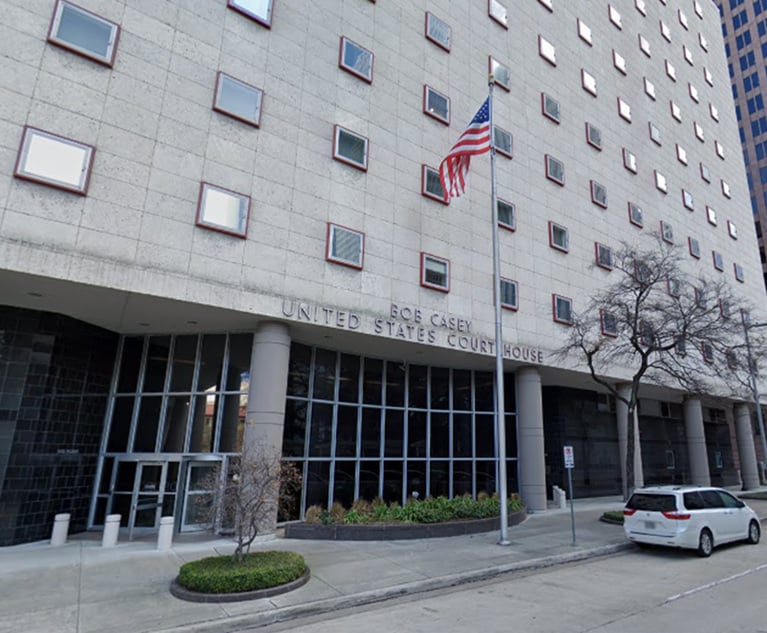MoFo Hit With Texas Lawsuit Alleging 'Egregious Overbilling'
The former client of Morrison & Foerster alleges the firm engaged in a "billing feeding frenzy," in handling the winddown of its companies.
February 14, 2019 at 08:06 PM
5 minute read
 Morrison & Foerster offices in New York.
Morrison & Foerster offices in New York.
A former client of Morrison & Foerster is accusing the firm of “egregious overbilling” in a federal lawsuit filed Wednesday in the U.S. District Court for the Western District of Texas.
Plaintiffs including Firestar Diamond International and its owner, jewelry designer Nirav Modi, allege in the complaint that they hired the firm to assist them in winding down companies, but instead of doing the work efficiently and promptly and keeping them informed, the firm concentrated on liquidating assets and transferring the money to the firm's client trust account.
“MoFo then expended an exorbitant and excessive amount of time, primarily on matters that had little to do with winding down the entities. In the course of two months, MoFo had 34 different timekeepers bill 669 hours at a cost of $484,321.39,” the plaintiffs allege in the complaint.
The plaintiffs, which also include Austin companies Synergies Corp., AVD Trading and FireStar Group LLC, allege that after Morrison & Foerster provided them with an itemized bill and an accounting of funds in the trust account, it terminated Morrison & Foerster's services.
“After that, MoFo deducted an additional $53,000 from plaintiff's funds and returned the balance six weeks later. To date, MoFo has failed to provide any information to justify taking this additional money, despite plaintiffs' requests,” the plaintiffs allege in the complaint.
According to the complaint, FireStar and the related companies are incorporated in Delaware, and their principal place of business is in Austin.
Separately, Modi is facing allegations by India's Punjab National Bank of engaging in a bank fraud scheme, reportedly involving at least $1.8 billion, according to media reports.
A spokesman for Morrison & Foerster did not immediately respond to a request for comment on the lawsuit Thursday.
The plaintiffs are represented by Anthony Buzbee and Peter Taaffe of Buzbee Law Firm in Houston.
Taaffe said the allegations paint a picture of billing that he's never seen before.
“I suspect it happens more than we think, and people just usually learn their lesson and don't hire these firms again, but this group was really shocked at the overbilling and the fact, mostly, that they took money from the trust account without permission,” Taaffe said.
As alleged in Synergies Corp. v. Morrison Foerster, the plaintiffs hired Morrison & Foerster on May 31, 2018, to wind down and dissolve the plaintiffs, liquidate the assets and distribute the proceeds to the owners.
After entering into an engagement agreement with Morrison & Foerster, the firm made two agreed-upon retainer payments of $15,000 and agreed to hourly billing.
The plaintiffs allege the representation should have been a “straight-forward assignment,” and the lawyers should have filed certificates of dissolution in Delaware, reviewed the clients' financial statements and prepared general ledger or balance sheets for the companies. Because they did not do those things, the plaintiffs allege, Morrison & Foerster “completely missed $17 million in claims that plaintiffs could have asserted in a bankruptcy action.” They allege that counsel they hired after firing Morrison & Foerster did assert the claims.
The plaintiffs allege that instead of “actually winding down the companies,” the firm focused on small components of the process, primarily liquidating claims at a discount so the funds could be sent to Morrison & Foerster's trust account to be used to pay the firm's “exorbitant bills.”
Specifically, the plaintiffs allege, Morrison & Foerster sold property to a jeweler in Miami and had $260,000 in proceeds wired to its trust account, but failed to consult with the plaintiffs until after the deal had been agreed to. They also allege the firm negotiated with a landlord in Las Vegas to return funds from a surety bond, but negotiated a $700,000 return on a bond valued at $1,362,080.
Additionally, among several other matters cited in the complaint, the plaintiffs allege the firm spent many hours and thousands in fees dealing with a storage facility to retrieve items valued at less than $5,000, but was not successful.
The complaint alleges that by late July 2018, the plaintiffs became concerned about the services Morrison & Foerster was and was not providing. They allege that on Aug. 3, 2018, the firm provided the “grossly excessive” billing statement for $483,321.39, and also reported that the plaintiffs had paid a $30,000 retainer and the firm had arranged for $625,319 to be paid to its trust account.
“The statement also reflected that Morrison & Foerster had unilaterally decided to pay itself from these funds—although this was never authorized. This left $170,978 in the trust account,” the plaintiffs allege.
The complaint also alleges that MoFo routinely billed for “duplicative assignments, inter-office conferences, emails among staff, each of whom appear to have billed for the same tasks” throughout.
“In sum, this was a billing feeding frenzy,” the plaintiffs allege.
After they fired the firm, the complaint said, Morrison & Foerster did a few weeks later send the plaintiffs $117,305, but never provided an accounting for the additional $53,000 deducted earlier.
The plaintiffs have brought breach of fiduciary duty, negligence, fraud, breach of contract and theft causes of action against Morrison & Foerster and seek actual damages of more than $1.5 million, plus punitive damages, attorneys fees and fee disgorgement.
This content has been archived. It is available through our partners, LexisNexis® and Bloomberg Law.
To view this content, please continue to their sites.
Not a Lexis Subscriber?
Subscribe Now
Not a Bloomberg Law Subscriber?
Subscribe Now
NOT FOR REPRINT
© 2025 ALM Global, LLC, All Rights Reserved. Request academic re-use from www.copyright.com. All other uses, submit a request to [email protected]. For more information visit Asset & Logo Licensing.
You Might Like
View All

Conspiracy Suits Against Quinn Emanuel, Roc Nation Moved to Federal District Court

JCPenney Seeks Return of More Than $1.1M From Jackson Walker For Bankruptcy Work
3 minute read
Ex-Appellate Court Judges Launch Boutique Focused on Plaintiffs Appeals
2 minute readTrending Stories
Who Got The Work
J. Brugh Lower of Gibbons has entered an appearance for industrial equipment supplier Devco Corporation in a pending trademark infringement lawsuit. The suit, accusing the defendant of selling knock-off Graco products, was filed Dec. 18 in New Jersey District Court by Rivkin Radler on behalf of Graco Inc. and Graco Minnesota. The case, assigned to U.S. District Judge Zahid N. Quraishi, is 3:24-cv-11294, Graco Inc. et al v. Devco Corporation.
Who Got The Work
Rebecca Maller-Stein and Kent A. Yalowitz of Arnold & Porter Kaye Scholer have entered their appearances for Hanaco Venture Capital and its executives, Lior Prosor and David Frankel, in a pending securities lawsuit. The action, filed on Dec. 24 in New York Southern District Court by Zell, Aron & Co. on behalf of Goldeneye Advisors, accuses the defendants of negligently and fraudulently managing the plaintiff's $1 million investment. The case, assigned to U.S. District Judge Vernon S. Broderick, is 1:24-cv-09918, Goldeneye Advisors, LLC v. Hanaco Venture Capital, Ltd. et al.
Who Got The Work
Attorneys from A&O Shearman has stepped in as defense counsel for Toronto-Dominion Bank and other defendants in a pending securities class action. The suit, filed Dec. 11 in New York Southern District Court by Bleichmar Fonti & Auld, accuses the defendants of concealing the bank's 'pervasive' deficiencies in regards to its compliance with the Bank Secrecy Act and the quality of its anti-money laundering controls. The case, assigned to U.S. District Judge Arun Subramanian, is 1:24-cv-09445, Gonzalez v. The Toronto-Dominion Bank et al.
Who Got The Work
Crown Castle International, a Pennsylvania company providing shared communications infrastructure, has turned to Luke D. Wolf of Gordon Rees Scully Mansukhani to fend off a pending breach-of-contract lawsuit. The court action, filed Nov. 25 in Michigan Eastern District Court by Hooper Hathaway PC on behalf of The Town Residences LLC, accuses Crown Castle of failing to transfer approximately $30,000 in utility payments from T-Mobile in breach of a roof-top lease and assignment agreement. The case, assigned to U.S. District Judge Susan K. Declercq, is 2:24-cv-13131, The Town Residences LLC v. T-Mobile US, Inc. et al.
Who Got The Work
Wilfred P. Coronato and Daniel M. Schwartz of McCarter & English have stepped in as defense counsel to Electrolux Home Products Inc. in a pending product liability lawsuit. The court action, filed Nov. 26 in New York Eastern District Court by Poulos Lopiccolo PC and Nagel Rice LLP on behalf of David Stern, alleges that the defendant's refrigerators’ drawers and shelving repeatedly break and fall apart within months after purchase. The case, assigned to U.S. District Judge Joan M. Azrack, is 2:24-cv-08204, Stern v. Electrolux Home Products, Inc.
Featured Firms
Law Offices of Gary Martin Hays & Associates, P.C.
(470) 294-1674
Law Offices of Mark E. Salomone
(857) 444-6468
Smith & Hassler
(713) 739-1250






